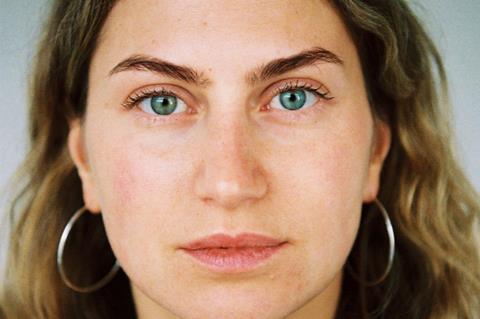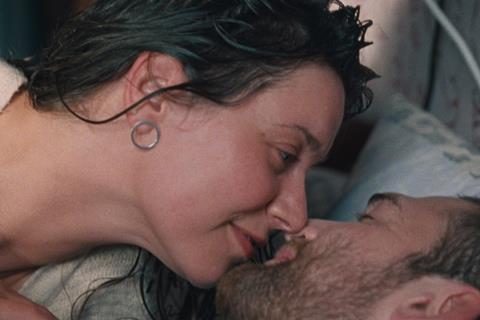
Lithuanian filmmaker Marija Kavtaradze came to international attention with her 2018 debut feature Summer Survivors, the story of a psychologist who travels with two patients suffering from mental illness. Premiering in official selection at Toronto, Kavtaradze was lauded for her empathetic stance amidst a raw and powerful drama
Her sophomore effort is Slow. The film follows sign-language interpreter Dovyda (Kęstutis Cicėnas) who meets dancer Elena (Greta Grinevičiūtė) with the pair immediately finding a spark between them. But as they begin a relationship, Dovyda reveals he’s asexual and both must soon navigate what this means for their future.
After world premiering at this year’s Sundance, Slow netted Kavtaradze the Best Directing Award (World Cinema Dramatic). The film has its European premiere as a special screening at Karlovy Vary on July 2.
Slow is a Lithuania, Spain and Swedish co-production. It’s produced by Vilnius based outfit M-Films and co-produced by Spain’s Frida Films and Barcelona’s Garagefilms. International Sales are handled by Totem.
Why did you choose to focus on asexuality for Slow?
I was intrigued by this topic for some time. I was researching it for a little while, but everything in the screenplay started moving forward when I realised that this was going to be a love story. Then I had a clear conflict with these different characters and their different needs. I think it’s more difficult for her – and us as audiences - to accept him because he’s male and asexual and she is a woman who expresses her needs.

How much did you research? Were you ever worried the film would become an ‘asexuality primer’?
There are always moral and ethical questions about representation. Do I have the right to do it, especially as a straight woman? I was researching a lot and when you do that, you can put way too much of it into the screenplay. I only left in the explanations where I thought she would ask and he would tell her. I don’t feel I have the responsibility to educate people.
Tell us about the casting of the leads
When I was working on a really early draft of the screenplay I told my producer, “I feel like I need to cast the leads now.” I had Greta in my mind while writing because I knew she’s a professional dancer, which I needed and I had seen her before in some plays: she can capture you and she stays in your head. We had a very informal casting and the very same day I said ‘So, do you want to do it?’
Then we started casting for the male lead with her [focusing on] chemistry and the feeling. Not only with the two of them but also the three of us, because we did work a lot together. It was still a very long process after that, writing and gathering financing. It was a very collaborative process with the actors.
What was it like working with DOP Laurynas Bareiša, who is a well-known Lithuanian filmmaker in his own right?
I’ve worked with Laurynas for a long time. He understands what I am writing and we have a really good connection. I was rehearsing a lot with the actors, first of all alone and then I invited Laurynas to participate. We didn’t even talk that much unless we felt that something didn’t look like our film, and we realised something was a little off and we had to solve it.
Your film is one of a spate of successful Lithuanian films as of late. What do you think has spurred on the country’s industry over the past few years?
Well Laurynas won in Venice [his debut feature Pilgrims won the Venice Horizons Award in 2021] and there was also Vytautas Katkus in Cannes with his short film [Cherries, which screened in Official Competition and was also produced by M-Films]. They both worked on this film (Vytautas was the camera operator) and I was just going “I have some the most successful directors in Lithuania working on my set. Thank you guys!”
But it’s not just the winning films: it’s the fact that we have so many different films coming out. We have good documentary, as always, but fiction is doing well. I think the Lithuanian industry is getting more and more alive,
The Lithuanian Film Centre just celebrated 10 years and we have better financing and better results. But as always, it’s not enough. The Cultural Ministry act like they’re proud of cinema but it’s not enough. And it will become a problem soon because there are lot of active filmmakers and there are a lot of talents and young filmmakers who still need to make their debut. I am grateful – I was very lucky and I did get financed – but I am saying this for my colleagues.

























No comments yet